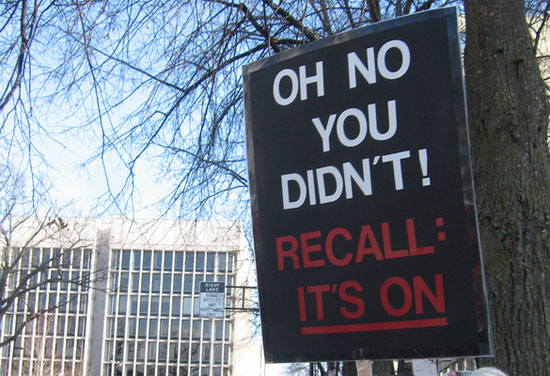All eyes on Wisconsin
From Politicians Don’t Pander: Political Manipulation and the Loss of Democratic Responsiveness by Lawrence R. Jacobs and Robert Y. Shapiro:
The Declaration of Independence was animated by a demand for “consent of the governed” and the promise of popular control has inspired a long and, at times, violent struggle for the right to vote by all Americans, the full and equal right to freedom of speech and assembly, and other essential rights.
Does the American government respond to the broad public or to the interests and values of narrowly constituted groups committed to advancing their private policy agendas? On one side lies democratic accountability; on the other a closed and insular government that is ill-suited to address the wishes or wants of most citizens. When politicians persistently disregard the public’s policy preferences, popular sovereignty and representative democracy are threatened.
|
|
|
| The responsiveness of national policymakers to what most Americans prefer has declined and remained low for almost two decades. | |
|
|
Can we rely on competitive elections to fend off muted responsiveness to centrist opinion? After all, congressional Democrats suffered stunning setbacks in the 1994 elections following Clinton’s campaign for an unpopular health care reform plan and the Republicans’ congressional majorities were reduced in the 1996 and 1998 elections after they pursued policies that defied strong public preferences. We argue that electoral punishment may not be enough to improve the public’s influence on government: the responsiveness of national policymakers to what most Americans prefer has declined and remained low for almost two decades despite electoral setbacks to Democrats and Republicans. Politicians have worked hard to obscure their true positions and to distort the positions of their opponents, which makes it hard for the electorate to identify the policy positions of elected officials and to punish politicians for pursuing unpopular policies. In addition, most members of Congress today attach greater electoral importance to following the policy goals of party activists than responding to centrist opinion. The bottom line is that most politicians are keenly motivated and amply skilled at evading electoral accountability for long periods. Their success has impaired our system of accountability and sullied the quality of citizenship by eroding public trust and fuelling the news media’s increasing focus on political conflict and strategy rather than on the substantive issues raised by government policy.
Our analysis should not be confused, however, with naive populism. We recognize that the sheer complexity and scope of government decisions require elite initiative, at times without public guidance. And, on occasion, elites may need to defy ill-informed and unreasoned public opinion in defense of larger considerations and, instead, rely upon the public’s post hoc evaluations of their actions and their arguments justifying their actions. Franklin Roosevelt’s arming of merchant marines prior to the United States’ entry into the Second World War and Richard Nixon’s opening to China represent such cases.
What we see today in contemporary American politics, however, far exceeds responsible leadership in a representative democracy. What concerns us are indications of declining responsiveness to public opinion and the growing list of policies on which politicians of both major political parties ignore public opinion and supply no explicit justification for it. The practice of American government is drifting from the norms of democratic responsiveness.
***
For more on Governor Scott Walker (esp. actions taken against collective bargaining and the right to unionize) and what has contributed to today’s historic recall election in Wisconsin, consider this. To read the full excerpt from Politicians Don’t Pander, which contextualizes public-opinion and government policy from FDR to the the Clinton–Gingrich era, go here.
